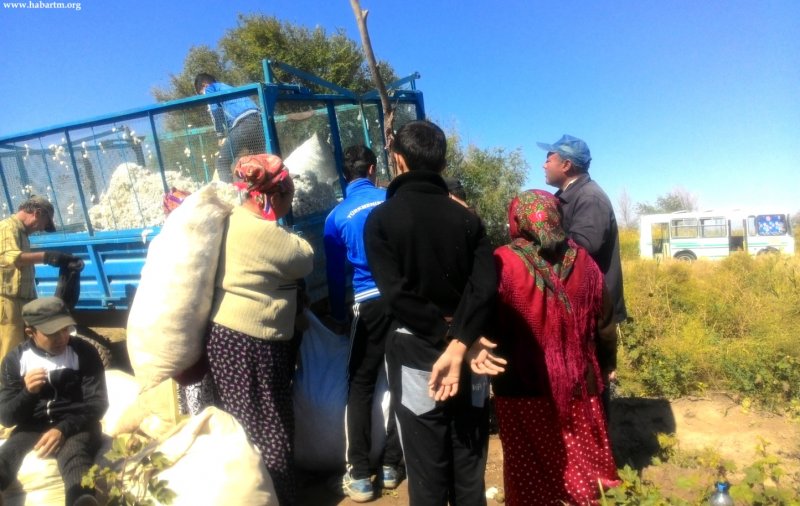Countries
Solidarity campaigns
The Price for Turkmen Cotton Is Too High

Turkmenistan may represent only 2% of the world’s cotton exports, but the rampant human rights violations in their cotton production demand our attention. Much of the country’s cotton is produced using a system of state-sponsored forced labor. This isn’t widely known, but Turkmenistan can’t fly under the radar and deliver goods produced with numerous human rights violations.
Both the International Labor Organization Conventions and Turkmenistan’s own national laws prohibit forced labor. However, the government disregards its own restrictions to harvest their cotton. Alternative Turkmenistan News, a civil media initiative, tracks forced labor in Turkmenistan cotton production, and their 2017 report details the most recent findings: a systematic abuse of labor with tens of thousands of civil servants, including young children, being forced to pick cotton under various threats.
It is without a doubt that the Turkmenistan government is complicit. The government owns all of the land in Turkmenistan, which enables them to force farmers to grow annual quotas of cotton or lose their land. The farmers are usually significantly underpaid for their crops, and the state has a monopoly on all purchasing and sales.
In addition, all public service workers, including teachers, doctors, nurses, and government staff, must pick cotton to meet their own harvesting quotas, under threat of dismissal, shortened work hours, and/or salary deductions. If they do not want to pick, they must pay a daily fee. Businesses are also forced to contribute labor under the threat of being closed.
Turkmenistan’s forced labor is not even limited to adults – children as young as elementary school age are also sent into the fields, sometimes replacing their parents when the parents must keep their jobs. They miss school to complete strenuous work in harsh conditions. If they’re not working in the fields, their teachers are. The cotton harvest is prioritized over everything, even the education and well-being of future generations.
As a result, communities are left in devastating condition. They don’t have access to many services - schools, hospitals, etc. - during the harvest season because public service workers are in the fields, not at their jobs. The workers must be in the fields regardless of adverse weather conditions and a lack of drinking water, food, or places to rest.
So, what can we do? RSN’s solutions include collaborating with the Cotton Campaign, a coalition advocating with governments, companies, and investors to use their leverage to end these continuous and systematic human rights violations once and for all. We recently launched the Cotton Pledge campaign to unify international clothing companies to boycott cotton sourced from Turkmenistan. These companies and brands are committed to not sourcing Turkmenistan cotton until the ILO and Cotton Campaign have both verified that forced labor has been eliminated.
In recent developments, the United States Customs and Border Protection issued a Withhold Release Order on May 18th, 2018, banning “all Turkmenistan cotton or products produced in whole or in part with Turkmenistan cotton.” This was an important success on the part of Cotton Campaign members in bringing awareness to this unacceptable issue and preventing goods made with forced labor from entering the supply chain.
While the situation in Turkmenistan demands our attention, the elimination of Uzbekistan’s forced labor is also still ongoing. Our Uzbek Cotton Pledge holds steady with 280 companies and brands signed on to commit to eliminating Uzbekistan’s cotton from their supply chains. You can read about Uzbekistan’s forced labor in cotton production in the Uzbek-German Forum’s most recent annual report.
Finally, to learn more about the situation in Turkmenistan, take a look at Supply Chain Dive’s recent brief or Cotton Campaign's page on forced labor in Turkmenistan. We encourage you to join the efforts to solve this problem by encouraging your favorite companies and brands to sign the Cotton Pledge, and using your power as a consumer to join the boycott by buying only brands that pledge to eliminate forced labor from their supply chains. With this new awareness, you can consciously avoid purchasing clothing and linens made with Turkmen cotton. Look carefully at what you buy and make sure you know what went into it before you vote for forced labor with your dollars.
Source: www.sourcingnetwork.org
